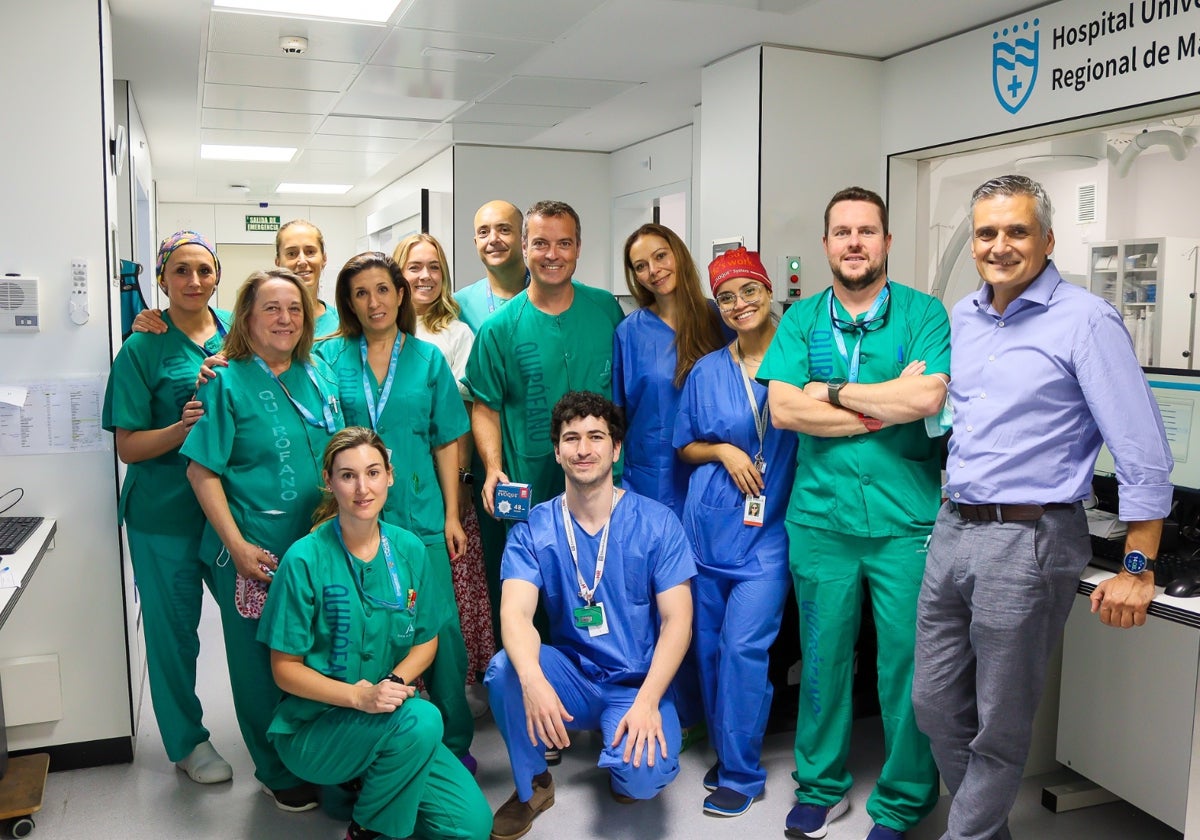Hospital Regional in Malaga successfully performs pioneering heart valve implant
This catheterisation is intended for patients who are not candidates for conventional open cardiac surgery, 'either because of their increased fragility or another concomitant disease'
A new milestone for Andalusian public health after the cardiology department of Hospital Regional Universitario in Malaga successfully carried out the first transcatheter valve implantation for the treatment of tricuspid valve insufficiency in the province at the end of July. The hospital is the first centre in Malaga and one of the first in Andalucía to offer this technique, together with Hospital Reina Sofia in Cordoba, which, being the pioneer, has already performed two operations, and Hospital Virgen del Rocio in Seville, which has incorporated it in recent days.
When the tricuspid valve of the heart, which separates the right atrium and ventricle, does not close properly, it allows blood to escape into the first chamber when the second one contracts, overloading it. This pathology is known as tricuspid or right-sided valvular insufficiency and, according to head of the cardiology department at Hospital Regional Cristóbal Urbano, it eventually causes "swelling due to oedema in all the lower limbs, as well as congestion of organs such as the liver, which eventually leads to liver failure, kidney failure and, ultimately, systemic failure".
The procedure was performed by a multidisciplinary team of professionals from the cardiology and anaesthesiology units.
Under-treated pathology
It is an under-treated pathology for which data is scarce. For example, only 0.4% of cases in the US are treated, out of a total of 1.6 million people who have the disease, as reported by an Immédico article. The Malaga team has successfully performed the implantation of a biological valve, "made with bovine pericardium", thanks to a catheter inserted through the groin with a minimal incision. It is an innovative intervention that opens the way in a new field in relation to one of the least treated heart conditions.
According to Urbano, this implant is only intended for "patients who are not candidates for conventional open heart surgery, either because of their increased fragility or another concomitant disease that makes the surgical risk high or even unacceptable".
Hospital Regional confirms that this is a pioneering intervention. "This valve has always been considered the Cinderella of the four we have in the heart," says Urbano. For the other valve disease they treat - aortic stenosis - 200 catheter operations a year are performed at the hospital in Malaga. For the last three or four years, tricuspid valves have also been repaired using a catheter technique. "But that is for repair, not replacement and that's the breakthrough this new valve brings. We usually carry out around 20 of those procedures a year."
Repair
Until now, a repair was done "edge to edge, like a clip that joined two of the three gates that the valve has, a kind of staple, and in that way we reduced tricuspid regurgitation", Urbano explains. Although this practice is still done, sometimes the gap between the gates prevents this option. "That gap is filled by this new valve, which is implanted and replaces the native valve in the same place. It is self-expandable and, using a catheter guided by transesophageal ultrasound and X-ray, we can place it exactly where the native valve is. As it self-expands, it anchors and begins to function," he says.
Above all, there is no need for open-heart surgery. Sometimes, surgeons prefer not to operate because of the excessive risk of the heart stopping. "There are fragile patients who cannot bear it, so we resort to the field of interventional cardiology to repair by catheter," Urbano explains, reminding the public that they are cardiologists and not surgeons, so they do not operate. "Everything is done through a small incision in the groin of just two centimetres and under general anaesthesia," he says.
Recovery is much quicker and quality of life is radically improved 24 hours after the operation. "These are patients who were already on a large number of diuretics, which is the basic treatment to reduce fluid overload. Imagine a person having to be on high doses of diuretics for life; the quality of life of having to urinate every few hours is horrendous. If surgery couldn't do anything, nor could catheter or repair therapies, this valve provides a solution," Urbano states. Between 20 and 30 patients from Malaga could benefit from this technique.
"We must value the technical resources and the highly qualified team of professionals at Hospital Regional, which allow us to offer this technique to those who need it. This is great news for public healthcare in Malaga, which has the same level of services as any other international reference centre," Urbano says.


Comentar es una ventaja exclusiva para registrados
¿Ya eres registrado?
Inicia sesiónNecesitas ser suscriptor para poder responder.
Necesitas ser suscriptor para poder votar.